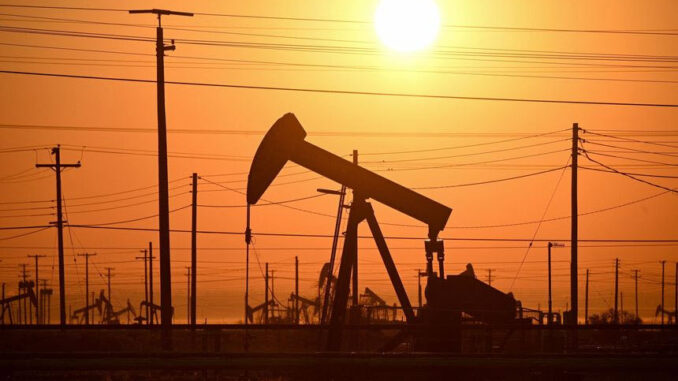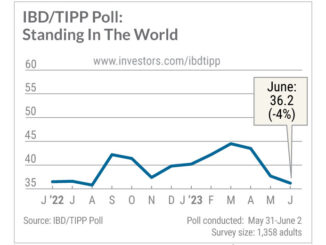
ENB Publishers Note: The result of bad energy policies has come home to roost on the White House doorstep. While this administration is making horrific energy decisions, there have been 20 years of world bad energy and monetary policies that have led up to this momentous disaster we now face. The world has printed money and the U.S. has followed with our highest inflation in 40 years and combined that with the bad energy policy decisions have resulted in a “pain at the pump” for years. It took us years to get here, and it will take years to fix.
WASHINGTON—President Biden came to office vowing to cut dependence on fossil fuels, putting environmentalists in charge of energy policy and asking Congress for billions of dollars to fund a transition to cleaner energy.
Seventeen months later, greenhouse gas emissions are up, renewable-power development has slowed, and oil and coal consumption are on the rise. The biggest aspects of the green agenda are stuck in Congress, while Mr. Biden, facing surging energy prices and inflation, urged U.S. oil refiners this week to expand capacity.
Domestic oil and gas production has increased since Mr. Biden came into office and is projected to rise to record highs, but that has just inflamed concerns from environmentalists that Mr. Biden is backing away from his green agenda.
“I thought the country had turned a corner,” said Mary Nichols, a former California regulator and longtime environmental leader, “that the country was headed in the right direction.”
“Now this last year or two leaves you wondering whether that is true,” Ms. Nichols said.
Mr. Biden reaffirmed his environmental commitments Friday at the Major Economies Forum on Energy and Climate, a virtual summit he hosted with representatives of more than 20 countries and international groups, including the European Commission and China.
“The critical point is that these actions are part of our transition to a clean and secure long-term energy future,” Mr. Biden said, adding later, “The science tells us that the window for action is rapidly narrowing.”
At home, however, Mr. Biden’s agenda has run into the reality of rising oil prices, punishing inflation and policy conflicts. Mr. Biden pledged last year to cut U.S. greenhouse gas emissions by 50% to 52% below 2005 levels by 2030. But doing so will require Congressional approval of measures such as tax incentives for clean energy, analysts say.
Coal-state Sen. Joe Manchin (D., W.Va.), who derailed Mr. Biden’s roughly $3.5 trillion climate and social spending bill last year, has been negotiating with Senate Majority Leader Chuck Schumer (D., N.Y.) on a new bill that would include the tax incentives, but a deal is far from certain.
The stakes for Mr. Biden are high. High inflation and record gasoline prices at the pump are a political liability heading into the midterm elections, where Republicans have a chance to seize majorities in the House and Senate.
At the same time, Mr. Biden risks losing support among young and progressive voters by seeming to back away from his green agenda, activists and political analysts said.
“It is hard to forever turn people out when you’re not producing results,” said Bill McKibben, an environmentalist and co-founder of 350.org, a group dedicated to stopping the use of fossil fuels world-wide. “Especially among young voters who care about this immensely there seems to be real signs it’s doing damage.”
“The critical point is that these actions are part of our transition to a clean and secure long-term energy future,” Mr. Biden said, adding later, “The science tells us that the window for action is rapidly narrowing.”
At home, however, Mr. Biden’s agenda has run into the reality of rising oil prices, punishing inflation and policy conflicts. Mr. Biden pledged last year to cut U.S. greenhouse gas emissions by 50% to 52% below 2005 levels by 2030. But doing so will require Congressional approval of measures such as tax incentives for clean energy, analysts say.
Coal-state Sen. Joe Manchin (D., W.Va.), who derailed Mr. Biden’s roughly $3.5 trillion climate and social spending bill last year, has been negotiating with Senate Majority Leader Chuck Schumer (D., N.Y.) on a new bill that would include the tax incentives, but a deal is far from certain.
The stakes for Mr. Biden are high. High inflation and record gasoline prices at the pump are a political liability heading into the midterm elections, where Republicans have a chance to seize majorities in the House and Senate.
At the same time, Mr. Biden risks losing support among young and progressive voters by seeming to back away from his green agenda, activists and political analysts said.
“It is hard to forever turn people out when you’re not producing results,” said Bill McKibben, an environmentalist and co-founder of 350.org, a group dedicated to stopping the use of fossil fuels world-wide. “Especially among young voters who care about this immensely there seems to be real signs it’s doing damage.”
Source: WSJ



